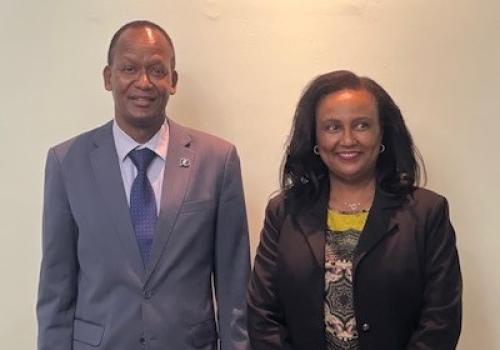The Southern African Development Community (SADC) remains focused on development of infrastructural projects that drive regional integration as outlined in the Regional Indicative Strategic Development Plan (RISDP) 2020-2030.
This was said by the SADC Executive Secretary, His Excellency Mr. Elias M. Magosi, during a courtesy call on him by Her Excellency Ms. Bajabulile Swazi Tshabalala, Senior Vice President of the African Development Bank Group, on the margins of the meeting of the Committee of Ministers of Finance and Investment and Peer Review Panel, held in Lilongwe, Malawi on 28th July, 2022.
The Executive Secretary stated that infrastructure development and industrialisation are key components towards SADC regional integration. He highlighted that development of infrastructure projects such as roads, railway lines, information communication technology, amongst others, are inevitable ingredients to facilitate seamless movement of people, goods and services in order to bring the desired developmental impact
He emphasised that the Region cannot progress without industrialisation, calling for positive exploitation of the identified value chains of agro-processing, mineral beneficiation and pharmaceuticals.
On mineral beneficiation, H.E Magosi outlined that the Region is awash with mineral wealth and raw materials, which if processed within the Region and sold as finished goods, could create the necessary jobs as opposed to the current situation where minerals and other raw materials leave the Region in raw form, only to return to the Region as expensive finished goods.
For agro-processing, he said the time has come for the Region to support subsistence farmers with infrastructure and resources to enable them to improve agricultural productivity. H. E Magosi observed that the sector has enormous potential not only to create employment, but also to create successful entrepreneurs, further noting that the majority of SADC citizens depend on agriculture for livelihoods.
On pharmaceuticals, the Executive Secretary highlighted that experiences learnt from COVID-19 pandemic are that the Region ought to invest greatly in manufacturing of vaccines to ensure adequate supply in the hour of need in order to reduce dependence on external support.
H.E Tshabalala concurred with the SADC Executive Secretary that without infrastructure development, they can never be regional integration. She observed that it still takes a long time to transport goods across the Region as opposed to transporting the same goods outside the Region. She called for standardised rules to ensure that trade is seamless, with bottlenecks removed to improve transport and transit facilitation measures. She also said industrialisation is key and must be built around the private sector as partners in the implementation of the SADC industrialisation agenda. She further recognised the value of empowering small-scale farmers by availing the necessary infrastructure, further indicating this as one of the areas of potential support by the Bank.
H.E Tshabalala further highlighted that the Bank’s High 5s: Light up and Power Africa; Feed Africa; Industrialise Africa; Integrate Africa; and Improve the Quality of Life for the people of Africa, which are similar to SADC priorities, will become the core of the new 10Year Bank Strategy following the end of the 2013-2022 Bank Strategy.
The two leaders also discussed modalities for mobilising resources for sustainably financing SADC infrastructure programmes in support of regional integration, and reiterated their commitment to enhance the existing partnership and collaboration between the two Institutions.

